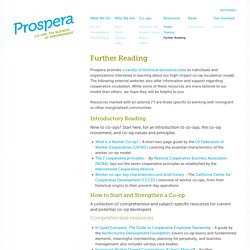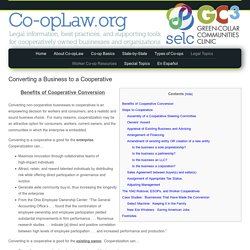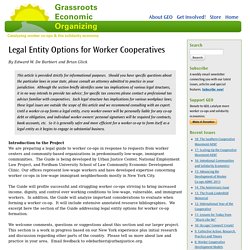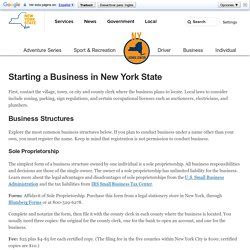

Further Reading. Prospera provides a variety of technical assistance tools to individuals and organizations interested in learning about our high-impact co-op incubation model.

The following external websites also offer information and support regarding cooperative incubation. While some of these resources are more tailored to our model than others, we hope they will be helpful to you. Resources marked with an asterisk (*) are those specific to working with immigrant or other marginalized communities. Introductory Reading New to co-ops?
How to Start and Strengthen a Co-op A collection of comprehensive and subject-specific resources for current and potential co-op developers Comprehensive resources Start guides How Do You Start a Co-op? Topic-specific resources Educational Opportunities Conferences and training opportunities in the cooperative field Professional Services Organizations that offer professional services (consulting, accounting, legal advice, and financial support) to co-ops. Consulting Accounting. Www.nami.org/Template.cfm?Section=Policy_Reports&Template=/ContentManagement/ContentDisplay.cfm&ContentID=169263. Converting to a Cooperative - Co-opLaw.org. Converting non-cooperative businesses to cooperatives is an empowering decision for workers and consumers, and a realistic and sound business choice.

For many reasons, cooperatization may be an attractive option for consumers, workers, current owners, and the communities in which the enterprise is embedded. Converting to a cooperative is good for the enterprise. Cooperatization can… Maximize innovation through collaborative teams of high-impact individualsAttract, retain, and reward talented individuals by distributing risk while offering direct participation in governance and surplusGenerate wide community buy-in, thus increasing the longevity of the enterpriseFrom the Ohio Employee Ownership Center: “The General Accounting Office’s . . . found that the combination of employee ownership and employee participation yielded substantial improvements in firm performance . . .
Legal Entity Options for Worker Cooperatives. By Edward W.

De Barbieri and Brian Glick This article is provided strictly for informational purposes. Should you have specific questions about the particular laws in your state, please consult an attorney admitted to practice in your jurisdiction. Although the section briefly identifies some tax implications of various legal structures, it in no way intends to provide tax advice; for specific tax concerns please contact a professional tax adviser familiar with cooperatives. Each legal structure has implications for various workplace laws; those legal issues are outside the scope of this article and we recommend consulting with an expert. Introduction to the ProjectWe are preparing a legal guide to worker co-ops in response to requests from worker centers and community-based organizations in predominantly low-wage, immigrant communities.
Limited Liability Company (LLC)This is a relatively new form, introduced throughout the U.S. in the early 1990s. The permanent link to this issue is. Choice of Entity - Co-opLaw.org. What are Business Entities?

Why is it important to choose the right entity when forming your business? A business entity describes the legal structure under which a business operates. If you wish to start a cooperative business, it is important to choose the right entity for a number of reasons, including the application of employment law, liability, and taxation. This chapter includes a very broad overview of such issues. For additional discussion, please refer to the other relevant chapters in this manual. What if I start doing business before forming an entity? If you start doing business before officially forming an entity, the law presumes that you are either a sole proprietorship (if there is one business owner), a general partnership (if there are multiple owners of the business) or, in certain cases, an unincorporated association.
How do I protect my personal assets? Form an entity that is protected by the limited liability shield! Do I need insurance? Www.tax.ny.gov/pdf/publications/multi/pub16.pdf. Starting a Business in New York State. First, contact the village, town, or city and county clerk where the business plans to locate.

Local laws to consider include zoning, parking, sign regulations, and certain occupational licenses such as auctioneers, electricians, and plumbers. Business Structures Explore the most common business structures below. If you plan to conduct business under a name other than your own, you must register the name. Keep in mind that registration is not permission to conduct business. Sole Proprietorship The simplest form of a business structure owned by one individual is a sole proprietorship. Form: Affidavit of Sole Proprietorship.
Complete and notarize the form, then file it with the county clerk in each county where the business is located. Fee: $25 plus $4-$5 for each certified copy. Partnership A partnership is the relationship between two or more persons or companies that carry on a trade or business together. Forming a Journalism Cooperative in New York. Legal Entity Options for Worker Cooperatives.